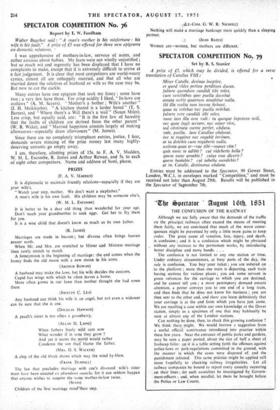"MIR lippettator ' gugust 16th, 1851
THE CONFUSION OF THE RAILWAY
Although we are fully aware that the demands of the traffic on the pribcipaL railways often exceed the means of meeting them fairly, we are convinced that much of the worst conse- quences might be prevented by only a little more pains to keep order. The great cause of vexation, loss, injury, and death, is confusion ; and it is a confusion which might be obviated without any increase to the permanent works, by introducing better discipline and more hands. . . .
The confusion is not limited to any one station or time.. Under ordinary circumstances, at busy parts of the day, the rule is confusion. You buy-your ticket ; you are ushered on to the platform ; more than one train is departing, each train having sections for varjous places ; you ask some servant in green velveteen for the carriage to which you are destined, and he cannot tell you ; a more peremptory demand extorts attention, a porter conveys you to one end of a long train, and then finds that he does not know his business ; you are then sent to the other end, and there you learn definitively that your carriage is at the end from which you have just- come. We are recalling a case within our own knowledge at the Dover station, simply as a specimen of one that may habitually be seen at almost any of the London stations.
Can nothing be done, then, to check this growing confusion ? We think there might. We would borrow a suggestion from a useful official' contrivance introduced into practice within these few years. Near the entrance of public parks and gardens, may be seen a paper posted, about the size of half a sheet of foolscap folio: op it is a table setting forth the offences against police-laws or park-regulations committed in the ground, with the manner in which the cases were disposed of, and the punishment inflicted. This same prictice might be applied still more hopefully to checking railway irregularities. Let all railway companies be bound to report every casualty occurring on their lines ; let such casualties be investigated by Govern- ment-officers ; and, when needful, let them be brought before the Police or Law Courts.






























 Previous page
Previous page